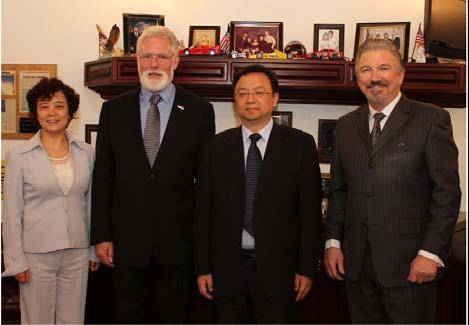

(Note: A Halloween-themed rally will take place Thursday, October 31, 11:30 a.m.-12:30 p.m., outside BYD’s office, 1800 S. Figueroa St. (at W. 18th St.), downtown Los Angeles.)
It was with great excitement that California elected officials welcomed the Chinese company Build Your Dreams (BYD) to build electric buses in places like Lancaster, Long Beach and Los Angeles. Hopes were high that BYD’s Zero Emissions buses would clean the air, and hundreds of Angelenos would go to work in BYD’s new downtown Los Angeles office, earning paychecks to support their families.
But this weekend, news reports revealed that the company’s promises of jobs and quality products couldn’t be more hollow. The California Department of Industrial Relations issued BYD numerous citations on October 10, fining the company $79,250 and requiring it to pay $20,000 in back wages to 22 employees.
City officials, according to the Los Angeles Times,
» Read more about: ‘Build Your Dreams’ Company a Nightmare for Workers »
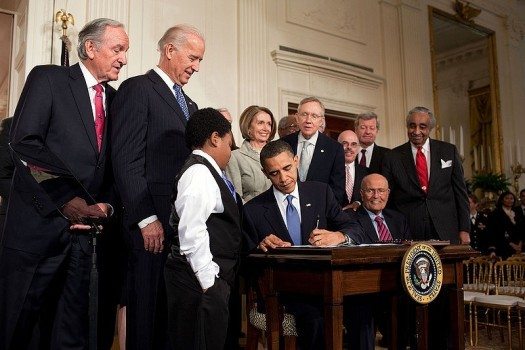
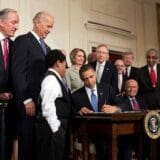
Republicans may not have succeeded in defunding the nations’ newest social insurance program, Obamacare, but they now are aiming at the foundational programs, Social Security and Medicare. And this time, they’ll have the President on their side. It would be a mistake for progressives to assume that a grand budget bargain will fall apart once again, even if that remains likely. Instead, we need to turn the debate from cutting social insurance to strengthening both the finances and benefits of both big retiree programs. The best way to do that is by championing simple, bold solutions.
In his post shutdown press conference, President Obama repeated his call for changes in Social Security and Medicare. His 2014 budget included cuts to benefits for both. That aligns him with House Speaker John Boehner, who called for savings in Social Security and Medicare during the shutdown battle. Senators from both parties have shown their willingness to support benefit cuts as part of a big budget deal.
» Read more about: Saving Medicare, Social Security: Block That Grand Bargain! »


This week marks the first anniversary of Hurricane Sandy, which one year ago tore a path of destruction through much of New York and New Jersey. While media coverage will no doubt focus on the images of nature wreaking havoc on the Eastern Seaboard, we would do well to look at the very human failings that contributed to the damage and suffering inflicted by Sandy.
A good place to start is the practices of companies like ConEdison, the utility giant responsible for electrical and gas service for much of the region. Like other utilities across the country, ConEdison has made significant cuts to its staff over the past several years, while using outside contractors to fill the gaps. In normal times, these cuts lead to unnecessary service delays and interruptions that inconvenience consumers. In a time of crisis, however, understaffing has much more serious consequences.
The overall impact of Sandy was staggering.
» Read more about: Hurricane Sandy: The Price of Deregulation »
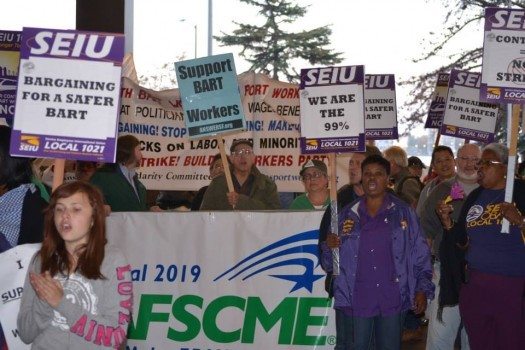
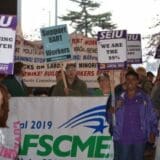
On Friday, BART [Bay Area Rapid Transit] employees at SEIU and ATU will likely ratify the deal negotiated last week and the following day BART’s Board of Directors will likely vote to approve it. Apart from a few crazies on both the left and right who were hoping that the strike or the dispute kept going, most of us BART riders will be extremely glad that it is finally over and hoping that we never have to go through this again. It’s not surprising, therefore, that some politicians have attempted to exploit public frustration. Orinda Councilman Steve Glazer, who is running for the California Assembly, has tirelessly promoted his campaign for change in state law to ban strikes by BART workers. It’s an easy time to call for coercive legislation but a strike ban is the wrong solution for the Bay Area and it wouldn’t work.
» Read more about: Banning BART Strikes Is No Answer to Labor Disputes »


 Rich and poor — two sides of the same coin. That “coin” meaning money and how much you have. While Americans seem to love money and idolize those who possess it, having it isn’t so good for you. That’s right. Not only does money not buy happiness, it can be downright hurtful to those who are rich, as well as the rest of us.
Rich and poor — two sides of the same coin. That “coin” meaning money and how much you have. While Americans seem to love money and idolize those who possess it, having it isn’t so good for you. That’s right. Not only does money not buy happiness, it can be downright hurtful to those who are rich, as well as the rest of us.
For years I have noticed that BMW drivers tend to cut people off and generally drive with an attitude of arrogance toward others. Now some recent studies demonstrate that I am not just seeing things. People with more expensive cars drive as though they’re entitled to cut people off at intersections or whip by on the right.
The rich also prefer to play and work alone – distancing themselves from others. But you don’t have to actually be rich to act like that.


(This article first appeared in the Sierra Club journal Sierra and is republished with permission.)
The late-June weekend heat wave comes on as predicted. By 10 a.m., it’s 90°F in a South Los Angeles parking lot where scores of local residents have gathered, lured by community leaders and the Los Angeles Department of Water and Power (DWP). Over the hum of the crowd, speakers take the stage for this Green the Block workshop: community organizers, environmentalists, labor union leaders and local politicians, all talking about the changing climate, the sputtering economy and the need to use less energy. It’s important stuff, but not particularly riveting. Meanwhile, it keeps getting hotter. By the time Ron Nichols, the utility’s general manager, takes the stage, the sun has chased people under canopies at either side of the lot and the chairs in front of him are almost empty.
» Read more about: Repowering Los Angeles One Block at a Time »
This past Friday Occidental College professor and Frying Pan News contributor Peter Dreier appeared on Moyers & Company. Dreier expressed an optimism that after 30 years of big business backing rightwing agendas, the consequences of those agendas have now boomeranged back against Wall Street, opening new possibilities for progressive change in America.
“Americans are now realizing more than ever that we need to go in a new direction,” said Dreier, the author of The 100 Greatest Americans of the 20th Century. “All over America right now there are people fighting back on the grassroots level.”
Click above to watch the entire interview or go to show site here.
» Read more about: Peter Dreier Tells Bill Moyers: Change Is Happening »



Conservative Republicans have lost their fight over the shutdown and debt ceiling, and they probably won’t get major spending cuts in upcoming negotiations over the budget.
But they’re winning the big one: How the nation understands our biggest domestic problem.
They say the biggest problem is the size of government and the budget deficit.
In fact our biggest problem is the decline of the middle class and increasing ranks of the poor, while almost all the economic gains go to the top.
The Labor Department reported Tuesday that only 148,000 jobs were created in September — way down from the average of 207,000 new jobs a month in the first quarter of the year.
Many Americans have stopped looking for work. The official unemployment rate of 7.2 percent reflects only those who are still looking. If the same percentage of Americans were in the workforce today as when Barack Obama took office,
» Read more about: Conservatives Are Crying – All the Way to Victory »


(Note: Jason Motlagh writes about the lack of compensation for the families of Rana Plaza victims for The Nation, where this post first appeared. Republished with permission.)
This week United Students Against Sweatshops (USAS) is holding demonstrations at more than 30 colleges and universities across the country as part of an International Week of Action to End Deathtraps commemorating the six-month anniversary of the Rana Plaza building collapse in Bangladesh.
Students and workers are demanding that apparel brands who produce apparel for U.S. universities sign on to the Accord on Fire and Building Safety in Bangladesh, a legally binding agreement now signed by over 100 brands and retailers, promising greater protection for workers and a voice for unions in addressing deadly working conditions. To date, not a single college-producing apparel company has signed the agreement. Bangladeshi unions are also holding demonstrations at the site of Rana Plaza collapse.
» Read more about: Students: School Clothiers Must Sign Fire and Safety Pact »


Faye Steuer is a former psychology professor living near Charleston, South Carolina, who spent much of her career researching how violence on television affects children. Over the years, Steuer learned about the inner workings of the media business and stumbled upon what she believes to be an even bigger problem.
“As I did that, I became more and more aware of how the consolidation of media ownership was really having an impact on democracy, and that worried me even more than the impact of [TV] violence on children,” Steuer tells Truthout.
A historic wave of corporate media consolidation is changing the landscape of America’s most utilized news source – local TV news. Media reformers say the consolidation diminishes the public’s access to information and, in turn, harms our democracy.
In the first eight months of 2013, 211 full-power broadcast stations changed hands, the highest number in a decade, according to a recent report by media watchdog group Free Press.
» Read more about: Remote Control: How Big Media Uses Shell Outfits to Expand »
It should serve as more than mere cold comfort that Charles and David Koch – the oil billionaires with a desire to remake America according to their own Dickensian vision of society – are about to be fined $1 million by California’s Fair Political Practices Commission. Today’s Los Angeles Times reports that a pair of the brothers’ political money funnels, Americans for Responsible Leadership and the Center to Protect Patient Rights, unlawfully directed $11 million to a campaign account set up to defeat Proposition 30 and promote Proposition 32 in 2012.
The first proposition, which aimed to raise tax dollars for public education, passed; the latter measure, intended to cripple the ability of public employee unions to participate in politics, didn’t.
Frying Pan News readers will remember how writers Matthew Fleischer and Bill Raden exposed the role of the out-of-state Brothers Koch and their moneyed front groups in the 2012 campaign.
» Read more about: Koch Brother Groups Fined for 2012 Campaign Violations »
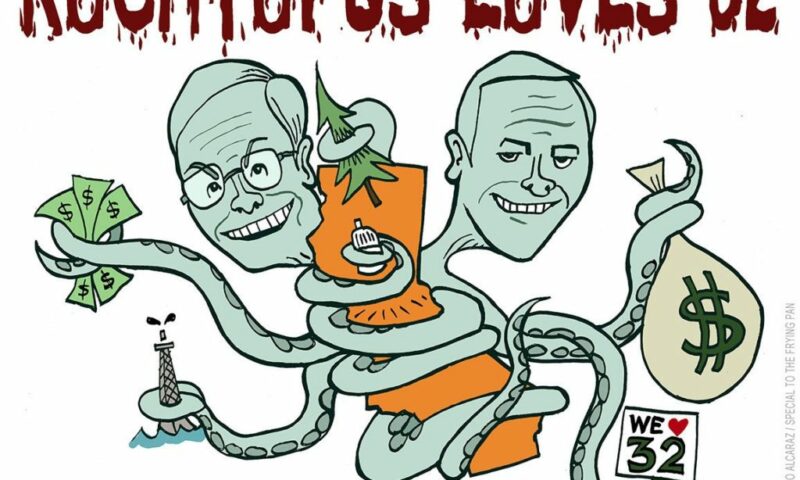

It should serve as more than mere cold comfort that Charles and David Koch – the oil billionaires with a desire to remake America according to their own Dickensian vision of society – are about to be fined $1 million by California’s Fair Political Practices Commission. Today’s Los Angeles Times reports that a pair of the brothers’ political money funnels, Americans for Responsible Leadership and the Center to Protect Patient Rights, unlawfully directed $11 million to a campaign account set up to defeat Proposition 30 and promote Proposition 32 in 2012.
The first proposition, which aimed to raise tax dollars for public education, passed; the latter measure, intended to cripple the ability of public employee unions to participate in politics, didn’t.
Frying Pan News readers will remember how writers Matthew Fleischer and Bill Raden exposed the role of the out-of-state Brothers Koch and their moneyed front groups in the 2012 campaign.
» Read more about: Koch Brother Groups Fined for 2012 Campaign Violations »



“If only they would run government like a business,” goes a familiar conservative lament, the gist of which equates “business” with the kind of furious efficiency that rewards honest, hard work in both industry and the animal kingdom. But now a new study shows what actually happens when elected officials hand over the keys to the private sector and ask it to run the services that society depends on.
Suddenly, according to Creating Scandals Instead of Jobs, the book of Ayn Rand fairy tales is shut and a dangerous reality asserts itself. The study, conducted by Good Jobs First, discovered an especially dizzying level of corruption in those enterprise and commerce agencies charged with expanding state economies and creating jobs. (Californians will remember how, until it was recently changed, their own Enterprise Zone program helped wreck the middle class by rewarding businesses for downsizing their work forces and lowering wages.)
Among Scandals/Jobs’ findings about so-called PPPs (public-private partnerships):
» Read more about: Public-Private Partnerships: Schools for Scandal »


We stood,
as women before us have stood,
looking back at our burning cities,
watching the smoke
rise from our empty homes.
It was quiet then. And cold.
We heard their cries, the caged birds
clawing at their perches, our daughters
naked in the hungry mob.
Such death. The smell of justice
drifting on the burnt wind.
We saw it all,
saw the fire fall like rain,
saw our tears
track stiff, white veins
down our bodies,
saw the brine crawl
through salt-cracked skin.
Now, turning in the restless night,
we dream we stand there still,
alone on the hill’s black belly.
We, the forgotten,
whose names were swallowed by God.
———————————————————————
This poem first appeared in Ploughshares,


 As our country’s economy has limped along from one crisis to another over the past several years, the impact of state and federal austerity measures on communities has exposed our troubling national priorities. A new report by the Center on Budget and Policy Priorities showed that despite the Great Recession technically ending in 2009, schools have yet to return to pre-recession spending levels, and in some states the cuts reach up to 20 percent per pupil. These drastic cuts have become the norm as communities in states that have resorted to austerity to put out short-term fires must now cope with the fallout from such measures.
As our country’s economy has limped along from one crisis to another over the past several years, the impact of state and federal austerity measures on communities has exposed our troubling national priorities. A new report by the Center on Budget and Policy Priorities showed that despite the Great Recession technically ending in 2009, schools have yet to return to pre-recession spending levels, and in some states the cuts reach up to 20 percent per pupil. These drastic cuts have become the norm as communities in states that have resorted to austerity to put out short-term fires must now cope with the fallout from such measures.
And then the government shut down.
So on top of underfunded schools, we had Head Start agencies on the chopping block,long-term WIC funding up in the air, furloughed workers flooding unemployment offices and the nation on the brink of defaulting on our debt yet again.
» Read more about: California’s Bold Alternative to Education Cuts »


 As classical music piped through the audio system at the McDonald’s in downtown Seattle on a recent day, customers devoured hamburgers while sitting in maroon-colored seats and at tables bathed in warm colors.
As classical music piped through the audio system at the McDonald’s in downtown Seattle on a recent day, customers devoured hamburgers while sitting in maroon-colored seats and at tables bathed in warm colors.
Customers lined up at registers, exchanging cash and credit cards for an assortment of hamburgers, fries and drinks.
These days, many fast-food employees at large restaurants are hoping that more than just hamburgers, tacos, fried chicken and sandwiches will be exchanged across restaurant counters.
They are hoping that higher hourly wages will come their way so they won’t have to apply for nearly $7 billion in U.S. taxpayer assistance each year to offset what they say are wages too low to support themselves and their families.
See infographic, below right, in Just the Facts.
Researchers at the University of California at Berkeley announced last week that the median national wage for front-line fast-food workers is $8.69 per hour and that the $7 billion in taxpayer support amounts to a subsidy for a $200 billion industry.


The war isn’t over. It’s only a cease-fire.
Republicans have agreed to fund the federal government through January 15 and extend the government’s ability to borrow (raise the debt ceiling) through February 7. The two sides have committed themselves to negotiate a long-term budget plan by mid-December.
Regardless of what happens in the upcoming budget negotiations, it seems doubtful House Republicans will try to prevent the debt ceiling from being raised next February. Saner heads in the GOP will be able to point to the debacle Tea Partiers created this time around – the public’s anger, directed mostly at Republicans; upset among business leaders and Wall Street executives, who bankroll much of the GOP; and the sharply negative reaction of stock and bond markets, where the American middle class parks whatever savings it has.
The saner Republicans will also be able to point out that President Obama means it when he says he won’t ever negotiate over the debt ceiling.
» Read more about: After the Cease-Fire: What to Expect from the GOP »


Sandy Hellebrand was concerned. She needed to find a school that could educate her son Gabriel, who has autism and was about to enter high school.
Hellebrand thought she had found the perfect solution: She would enroll Gabriel and her two younger children in Sky Mountain Charter School, one of a rapidly-growing number of virtual schools in California and across the country.
After all, she reasoned, the school would provide excellent online instructional materials and instructors to guide Gabriel’s individual needs. Since Sky Mountain is a publicly funded school – although not a traditional brick-and-mortar one – the state of California would pay for her children’s education. And Hellebrand and her husband Rob, a public high school teacher, would receive about $1,800 a year for each of their children to help defray their costs of educating them at home.
“The idea is fantastic,” she says in an interview with Frying Pan News.


Chi-Town, the Windy City, Chicagoland – whatever you want to call it, the city just made a bold move to encourage good American jobs. On October 18, the Chicago Transit Authority (CTA) for the first time asked companies vying for a $2 billion contract to manufacture 854 rapid transit cars to disclose their plans to create American jobs and opportunities for American workers. CTA’s addendum to its Invitation for Bids encourages companies to develop comprehensive American jobs plans and follow through to create them if awarded the contract – a move that could create as many as 20,000 good American manufacturing and related jobs, according to University of Massachusetts, Amherst economists.
Jorge Ramirez, President of the Chicago Federation of Labor celebrated the decision, saying, “We applaud Mayor Emanuel and the CTA for taking a lead role in bolstering Chicago’s economy and creating jobs. We urge manufacturers to work in partnership with the CTA to create quality manufacturing jobs here in Chicago and around the U.S.”
CTA’s adoption of the Jobs to Move America framework demonstrates the growing muscle of the coalition of community,
» Read more about: Chicago Gets Rolling Toward Good American Jobs »
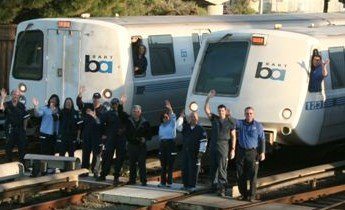

 A tentative agreement between striking Bay Area Rapid Transit workers and BART management has ended the employees’ four-day strike. The new contract must be approved and ratified by members of SEIU 1021 and ATU 1555, the rail system’s two largest unions.
A tentative agreement between striking Bay Area Rapid Transit workers and BART management has ended the employees’ four-day strike. The new contract must be approved and ratified by members of SEIU 1021 and ATU 1555, the rail system’s two largest unions.
Last night, in a statement released by Local 1021, John Arantes, BART Chapter President of that local announced:
“Tonight the hard working men and women who keep the Bay Area moving, can go back to work making BART the most efficient and successful system in the country.”
Added Des Patten, President of SEIU 1021’s BART Professional Chapter:
“Let us be clear that our commitment to improving the safety at BART doesn’t end with these negotiations. With this agreement, we expect that General Manager Grace Crunican will continue the dialogue with its unions on working conditions and health and safety at BART.”
According to SFGate,